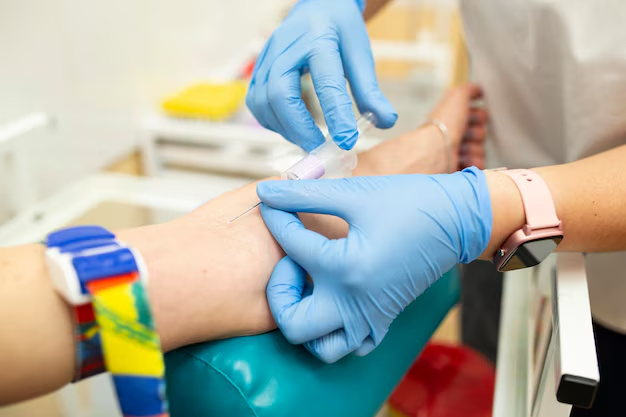Can a Blood Test Detect Cancer? What You Need to Know
It's a common concern and a frequently asked question: Can a blood test show cancer? Many people hope for a straightforward yes or no answer, but the reality is more nuanced. With advances in medical technology, blood tests play an increasingly significant role in detecting cancer, monitoring treatment, and evaluating overall health. Let's explore how blood tests contribute to understanding and managing cancer without losing sight of practical steps for individuals concerned about cancer screening.
Understanding Blood Tests for Cancer Detection
Blood tests can offer clues concerning your health, but alone, they are not definitive for diagnosing cancer. Different types of blood tests can serve various purposes, from screening to ongoing monitoring of treatment.
Common Blood Tests Related to Cancer
Complete Blood Count (CBC): measures different components of your blood. While it doesn't diagnose cancer, abnormal results might suggest the need for further investigation.
Tumor Marker Tests: These look for substances produced by cancer cells or by your body in response to cancer. Some markers like PSA (Prostate-Specific Antigen) are specific to certain cancers.
Liquid Biopsy: A cutting-edge approach that detects cancer DNA fragments circulating in the blood. Useful in detecting specific mutations related to cancer.
What Blood Tests Can and Cannot Do
What They Can Do
- Support Diagnoses: While not standalone diagnostic tools, blood tests can guide doctors in deciding whether more tests are needed.
- Monitor Treatment Effectiveness: Blood tests can help track how well treatment is working and adjust approaches if necessary.
- Detect Recurrence: They can be part of follow-up care to monitor if cancer returns after treatment.
What They Cannot Do
- Diagnose Alone: A blood test can't confirm if you have cancer. They are part of a larger diagnostic toolkit that includes biopsies, imaging, and physical exams.
- Predict Future Risk: While some tests assess genetic markers that might indicate risk, they don’t provide certainties about future cancer development.
How Blood Tests Fit Into Cancer Screening
The Role of Screening
Screening tests are designed to detect the early signs of cancer before symptoms appear. In some cases, blood tests are part of a broader screening strategy:
- Routine Check-ups: Regular medical exams often include blood tests that could catch anomalies early.
- High-Risk Groups: Those with genetic predispositions to certain cancers might undergo more frequent screenings, involving blood tests among other methods.
Combining Blood Tests with Other Diagnostic Tools
Diagnosis typically follows odd findings in initial screenings or symptom presentations. The usual procedure would involve:
- Imaging Tests: X-rays, MRI, CT scans, and ultrasounds can provide visual evidence of tumors.
- Biopsies: The most definitive method, involving the removal of tissue for microscopic examination.
Advances in Blood Test Technology
Novel Approaches
Genomic Profiling: Offers personalized insights by examining DNA in blood, highlighting mutations that might indicate cancer.
Early Detection Research: Several emerging tests aim to identify cancer earlier than traditional methods, potentially revolutionizing early treatment efficacy.
Current Limitations
Despite advances, these technologies are often still restricted to research settings, not yet broadly available for routine screening nor approved for all cancer types.
Decoding Tumor Markers: What Do They Mean?
Tumor markers are used to track cancer, but they must be interpreted cautiously:
- Sensitivity and Specificity: High levels may not always equate to cancer, and low levels do not rule it out.
- Types of Cancer: Specific markers are associated with particular cancers. For example, CA-125 for ovarian cancer, but they cannot be generalized to all instances.
When to Consider Cancer Screening
Risk Factors to Consider
- Family History: Genetic predisposition might warrant earlier and more frequent testing.
- Lifestyle: Smoking, diet, and exposure to harmful chemicals may increase screening needs.
- Age and Gender: Certain cancers are more common in specific demographics, suggesting tailored screening strategies.
Communication with Healthcare Providers
Ensuring open communication with healthcare professionals is critical. Here’s how to foster useful dialogue:
- Express Concerns Clearly: Share family medical history and personal concerns.
- Ask About Options: Explore the full range of available tests that may apply to your situation.
- Follow Recommendations: Adhere to screening guidelines based on both your medical history and physician advice.
Supporting Health Through Knowledge
The quest to understand how blood tests relate to cancer detection is part of a broader commitment to proactive health management. Acting on the following points can greatly enhance one's health journey:
- Stay Informed: Keep abreast of advancements in cancer research and screening technology.
- Investigate Thoroughly: If concerns arise, pursue a comprehensive diagnostic pathway, combining blood tests with necessary imaging and biopsies.
- Advocate for Personalized Care: Tailor screening and treatment plans to your unique risk profile.
A Snapshot of What Blood Tests Reveal 🩸
- CBC: Useful for initial health screenings but non-definitive for cancer.
- Tumor Markers: Indicate cancer presence but require careful interpretation alongside other diagnostics.
- Liquid Biopsy: Innovatively detects cancer DNA in blood, promising earlier detection.
Key Tips to Remember:
- 🧪 Combine Blood Tests with Comprehensive Diagnostics: They are part of a larger toolkit.
- 🏥 Regular Screenings Based on Risk: Essential for early detection and long-term health.
- 📊 Stay Informed on Technology Advances: Emerging tests could enhance standard care procedures.
Understanding how blood tests fit into cancer detection provides a foundation for informed interactions with healthcare providers, empowering you to take an active role in your health and wellness journey.

Related Articles
- Are Breast Cancer Lumps Painful
- Are Chills a Sign Of Cancer
- Are Colon Spasms a Sign Of Cancer
- Are Lytic Lesions Always Cancer
- Are Polyps Cancer
- Can a Blood Test Detect Cancer
- Can a Ct Scan Detect Cancer
- Can a Dexa Scan Show Cancer
- Can a Gastric Emptying Scan Show Cancer
- Can a Lung Biopsy Cause Cancer To Spread
